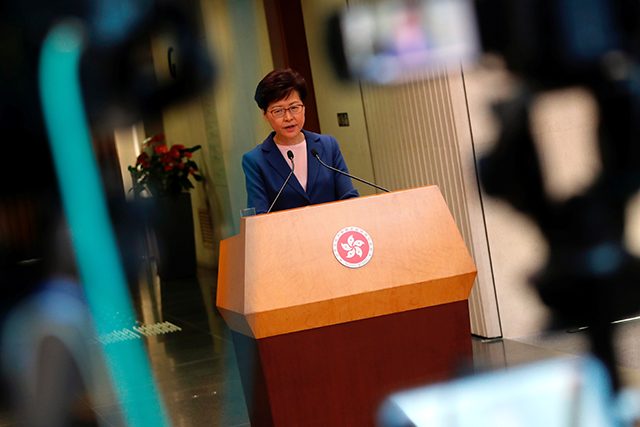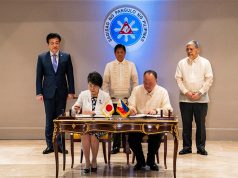
HONG KONG — Hong Kong leader Carrie Lam’s apologies and explanations for a doomed extradition bill have failed to quell political tension and her departure is now seen by many in the Chinese-ruled city as merely a matter of time in a drawn-out, long goodbye.
On Tuesday, Lam described the bill, which would have allowed people in Hong Kong, with its cherished rule of law, to be sent to mainland China for trial and pave the way for assets to be confiscated, as “dead”.
But activists and protest groups said they could not trust her words and are increasing demands for her to officially withdraw the bill and step down.
And they are vowing further action, after weeks of huge and at times violent street protests that have plunged the city into its worst crisis since Britain handed it back to Chinese rule in 1997.
On Saturday, some groups will spread their message to mainland traders in a New Territories village near the city’s border with China – a step seen as a further provocation of Communist Party leaders in Beijing.
And while Lam, a self-styled “Iron Lady”, has vowed to stay on, her latest statements have only fueled speculation that she has already offered to quit.
When asked about whether she would honor demands that she resign just two years into her first five-year term, Lam said that it was “not a simple thing for a CE (chief executive) to step down”.
“I myself still have the passion and undertaking to service Hong Kong people,” Lam said.
For some analysts, Lam’s statement was a sign that she may have already tendered her resignation. But Beijing will only let her go when the time is right.
“It is more complex than ordinary people assume… You can’t just quit when you like and walk away when it comes to dealing with Beijing,” said political scientist and commentator Sonny Lo.
Beijing leaders, he said, had to weigh domestic and regional risks and find a replacement – no easy task for a job widely seen as a poisoned chalice, weighing Hong Kong‘s cherished freedoms and the Communist Party’s authoritarian instincts.
Under the handover deal with Britain, Hong Kong was allowed to retain extensive freedoms not enjoyed on the mainland under a “one country, two systems” formula, including its independent judiciary and right to protest.
Beijing might want Lam to at least repair some of the damage caused by the extradition bill fiasco before leaving to help any successor, but would almost certainly want her gone before Legislative Council elections in September next year, Lo said.
Already Hong Kong‘s pro-Beijing camp is showing signs of splits amid the fallout of Lam’s championing of the extradition bill, which sparked a broad range of criticism from within establishment circles.
In the shorter term, some diplomats and analysts believe Beijing will not want to further dent the image of “one country, two systems” ahead of presidential elections in neighboring self-ruled Taiwan in January.
Beijing leaders have started again touting “one country, two systems” as a model for Taiwan, which they consider a wayward province. Taiwan has rejected the offer.
Ming Sing, an associate professor at the Hong Kong University of Science and Technology, said he believed that Beijing was not letting Lam step down.
“If she resigns right now, if she is compelled by Beijing to resign, that would send a very strong signal to Hong Kong and the international community that Beijing, the largest one-party state, the largest authoritarian state in the world, would back down in the face of popular pressure,” he said.
Even so, some analysts and diplomats note Lam has already harmed the broader national security agenda of Chinese President Xi Jinping, making it harder to introduce any new security-related laws in Hong Kong and refreshing calls for democratic reforms.
Hong Kong lawmaker Fernando Cheung told Reuters that Lam was now a lame duck who will not be able to complete her term.
“How the government and the chief executive handled the outcry from the public also made a lot of people aware that without true democracy, there is no hope for accountable governance,” the Labour Party legislator said. “So once the awareness is there, there is no return.”
With protest placards declaring that “Bloody Carrie” Lam had “sold Hong Kong” and with her popularity ratings lower than any other post-handover leader, recent weeks have marked a swift reversal of fortune for a leader who took office vowing to unite the city.
For many, her fate now echoes that of Hong Kong‘s first post-handover leader, Tung Chee-hwa. Tung offered to step down immediately after half a million people took to the streets in 2003 to protest against proposed national security laws, which were also eventually shelved.
It would not be until nearly two years later – mid-way through his second term – that he was able to finally leave.
“To go away is easy,” he said at the time. “To stay is much harder.”—Reporting By Greg Torode and John Ruwitch; Additional reporting by Anne Marie Roantree, Farah Master and Clare Jim; Editing by Nick Macfie









